Bb5.5
Pollux was the twin in the east (*) and Castor was
his mortal
twin in the west (†).
... Maui at
first assumed the form of a kiore, or rat, to enter the
body of Hine.
Kiore. Rat. Vanaga. Rat, mouse; kiore hiva,
rabbit. P Pau., Mgv.: kiore, rat, mouse. Mq.: kioē,
íoé, id. Ta.:
iore, id. Churchill.

But tataeko, the little whitehead,
said he would never succeed in that form. So he took the form of
a toke, or earth-worm.
Toke. To steal;
thief; toketoke, to repeatedly steal things of little
value; vî'e toke kenu, adulterous woman (lit.: woman who
steals husbands). Vanaga. Toke. To dupe, to extort, to
usurp; toketoke, to steal, to rob, to extort, to defraud,
to spoil, thief. Tokea, a dupe. Tokenoho,
intruder. Churchill.
But tiwaiwaka the fantail,
who did not like worms, was against this. So Maui turned
himself into a moko huruhuru, a kind of caterpillar that
glistens.
Huru. Custom, tradition, behaviour,
manners, situation, circumstances; poki huru
hare, child who stays inside (to keep a fair complexion);
te huru o te tagata rivariva, a fine person's behaviour;
pehé te huru o Hiva? what is the situation on the mainland?
Huruhuru, plumage, feathers (the short feathers,
not the tail feathers), fleece of sheep. Vanaga. Samoa:
sulu, a torch; to light by a torch; sulusulu, to
carry a torch; susulu, to shine (used of the heavenly
bodies and of fire). Futuna: susulu, the brightness of
the moon. Tonga: huluaki, huluia, huluhulu,
to light, to enlighten; fakahuhulu, to shine; iuhulu,
a torch or flambeau, to light with a torch. Niuē:
hulu, a torch;
huhulu, to shine (as the
moon). Maori: huru,
the glow of the sun before rising, the glow of fire. Churchill
2. Ta.: tahuhu, ridgepole. Ma.: tahuhu, id.
Mgv.: tohuhu, a ridgepole. Mq.: tohuhu, ridge,
roofing. Churchill.
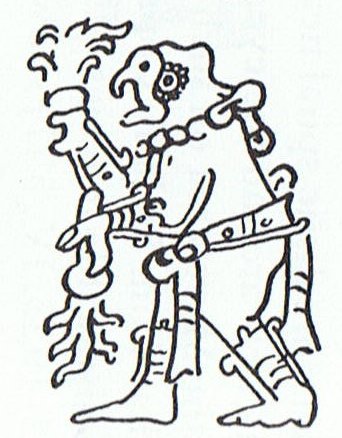
It was agreed that this looked best, and so Maui
started forth, with comical movements.
The little birds now did their best to
comply with Maui's wish. They sat as still as they could,
and held their beaks shut tight, and tried not to laugh. But it
was impossible. It was the way Maui went in that gave
them the giggles, and in a moment little tiwaiwaka the
fantail could no longer contain himself. He laughed out loud,
with his merry, cheeky note, and danced about with delight, his
tail flickering and his beak snapping. Hine nui awoke
with a start. She realised what was happening, and in a moment
it was all over with Maui. By the way of rebirth he met
his end ...
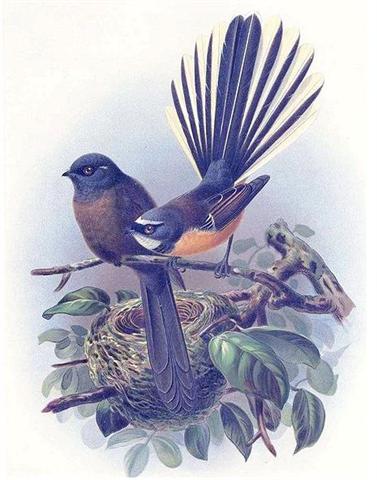
|
Jan 9 |
10 |
11 (360 + 16) |
12 |
13 (378 → Saturn) |
 |
 |
 |
 |
 |
|
Bb5-1
(148 + 16 = 164) |
Bb5-2 (11
* 15) |
Bb5-3
(166 = 150 + 16) |
Bb5-4 (588 = 7 * 84) |
Bb5-5
(3 * 191 + 16) |
|
Ki te manu gutu roaroa |
kua hahata ia te vaha ona |
mai tae tanu
hia te
tau moko |
e manu rere |
ki te mauga |
|
Tanu.
To cover something in the ground with
stones or soil; to bury a corpse; tanu
kopú, to bury completely; this
expression is mostly used figuratively:
ka-tanu kopú te vânaga tuai era, ina ekó
mana'u hakaou, forget those old stories,
don't think of them again. Vanaga. To bury,
to plant, to sow seed, to inter, to implant,
to conceal; tagata tanukai, farmer;
tanuaga, burial; tanuaga papaku,
funeral; tanuga, plantation;
tanuhaga, funeral, tomb. P Pau.: tanu,
to cultivate. Mgv.: tanu, to plant,
to bury. Mq.: tanu, to plant, to sow.
Ta.: tanu, to plant, to sow, to bury.
Churchill.
Moko.
1. Lizard; moko manu uru,
figurine of a lizard (made of wood). 2.
To throw oneself on something, to take
quickly, to snatch; to flee into the depths
(of fish); tagata moko, interloper,
intruder, someone who seizes something
quickly and swiftly, or cleverly intrudes
somewhere; ka-moko ki te kai, ka-moko,
ka-aaru, quickly grab some food, grab
and catch. 3. To throw oneself upon someone,
to attack: he-moko, he-reirei, to
attack and kick. 4. Moko roa: to make
a long line (of plantation); moko poto,
to make a short line. 5. Ihu moko; to
die out (a family of which remains only one
male without sons); koro hakamao te mate
o te mahigo, he-toe e-tahi tagata nó, ina
aana hakaara, koîa te me'e e-kî-nei:
ku-moko-á te ihu o te mahigo. when the
members of family have died and there
remains only one man who has no offspring,
we say: ku-moko-á te ihu o te mahigo;
to disappear (of a tradition, a custom),
me'e ihu moko o te tagata o te kaiga nei, he
êi, the êi is a custom no longer
in use among the people of this island.
Vanaga. 1. Lizard. P Pau., Mgv., Mq.:
moko, id. Ta. moó, id. 2. To
stun, to be dizzy. PS Sa.: mo'o, to
be surprised. Hakamoko, to
accomplish. Mokohi, grain, full-grown
berry (mokoi); mokohi haraoa,
grain. Mgv.: mokohe, food.
Mokoimokoi, heart T, kidney. Mokomoko,
sharp, pointed, slender, cape, headland;
gutu mokomoko, pointed lips. Churchill.
Mgv.: mokora, a duck. Ta.: moora,
id. Churchill. ... A une
certaine saison, on amassait des vivres, on
faisait fête On emmaillotait un corail,
pierre de défunt lezard, on l'enterrait,
tanu. Cette cérémonie était un point de
départ pour beacoup d'affaires, notamment de
vacances pour le chant des tablettes ou de
la priére, tanu i te tau moko o tana pure,
enterrer la pierre sépulcrale de lézard de
sa prière ...
Maúga. 1. Last;
aga maúga o te Ariki o Hotu Matu'a, King
Hotu Matua's last work. 2. Hill, mountain.
Mouga, moúga. Last; vânaga moúga o
te Ariki O Hotu Matu'a, the last words
of King Hotu Matu'a. Vanaga. Mauga kore,
impalpable. Mouga. 1. Enough, that's
all, at last. 2. Mountain, ridge of hills;
mouga iti, hillock; tua mouga,
mountain top; hiriga mouga; hillside,
declivity, slope. P Pau.: mahuga,
mountain. Mgv.: mou, maga,
mountain. Mq.: mouna, mouka,
peak or crest of a mountain. Ta.: maua,
moua, mountain. 3. Extinction, end,
interruption, solution; te mouga o te
hiriga, end of a voyage; pagaha mouga
kore, without consolation. 4. To get.
Churchill. |
|
ALUDRA (Virgin) =
η
Canis Majoris
(111.1),
PROPUS = ι Gemini (111.4),
GOMEISA (Water-eyed) = β Canis Minoris
(111.6)
*70.0 = *111.4 - *41.4 |
ρ Gemini
(112.1),
Eskimo Nebula = NGC2392 Gemini
(112.2)
ANTARES (α Scorpii) |
Al Dhirā'-5 (Forearm)
/
Punarvasu-7 (The Two
Restorers of Goods) /
Mash-mashu-Mahrū-10
(Western One of the Twins)
CASTOR (Beaver) = α Gemini (113.4)
*113.4 = *41.4 + *72.0 |
ANA-TAHUA-VAHINE-O-TOA-TE-MANAVA-7 (Pillar
for Elocution)
υ Gemini (114.0),
MARKAB PUPPIS = κ Puppis
(114.7), ο Gemini (114.8),
PROCYON = α Canis Minoris
(114.9) |
α Monocerotis
(115.4),
σ Gemini (115.7)
*74.0 = *115.4 - *41.4 |
|
July 10 |
11 |
12 (193) |
13 |
14 |
|
'June 12 |
13 |
14 (166) |
15 |
16 |
|
"May
30 |
31 |
"June 1 (152) |
2 |
3 |
|
MAY 7 |
8 |
9 (129) |
10 |
11 |
|
...
Originally the highly born family of the
Sun, Moon, and stars dwelt in a cave on the
summit of Maunga-nui, Great Mountain,
in the ancient homeland. They were not at
all comfortable in their gloomy home for
they could not see distinctly and their eyes
watered constantly. After the Sky-father had
been elevated to his present eminence
Tane decided that the celestial family
would be happier in the sky, where they
would serve the double purpose of
ornamenting the naked body of Rangi
and giving light to the Earth-mother. Since
Papa had already been turned with her
face toward the Underworld it is difficult
to see how she would benefit by the
illumination ... |
|
Jan 14 |
15 (380) |
16 (365 + 16) |
 |
 |
 |
|
Bb5-6 (590 =
20 * 29½) |
Bb5-7 |
Bb5-8 (171 =
9 * 19) |
|
kua kake ko kahini |
kua kake o manava te kahini |
kua kake
ko Reha - kua kake
ko Apareha |
|
Manava. Abdomen, belly,
(fig.) affection, sensitivity, feelings;
manava more, grief; manava mate,
infatuated, in love (with something); ku-ká-á
te manava, flared up, infuriated, irate;
he-kava te manava, offended, to turn sour,
embittered. See also hatu (manava hatu).
Vanaga. Belly, abdomen, entrails, interior;
manava ahuahu, indigestion; manava
hanohano, high tempered, to annoy; manava
itiiti, frugal; manava karavarava,
colic; manava mate, to be in ecstasy,
passion, intensity of affection; manava more,
to desolate; manava ninihi, colic;
manava nuinui, appetite; manava pagaha,
affected, to complain; manava rakerake,
bad character; manava riri, anger;
manava ru, complaint; manava ruru,
alarm, consternation, emotion, swoon; manava
tagi, eager; manava tiha, out of
breath; manava topa ki raro, humble, to
humiliate; manava vai, simpleton, to have
dull senses; meniri ko manava, little
finger; kakari manavai, waist; manava
eete, to shudder, to tremble, to astonish;
anger, fright, consternation; manava eete ki
te mau mea ananake, susceptible;
eete manava, affected, moved; manava pohi,
hasty, cruel, penitent; contrition, indignation;
kokoma hanohano manava pohi, to abhor;
manava pohi nunui ke, implacable. P Pau.:
manava, the interior, affected, touched.
Mgv.: manava, the belly, spirit,
conscience. Mq.: menava, respiration,
pulse. Ta.: manava, belly, entrails.
Churchill.
Koreha. 1. Sea eel;
several sorts are distinguished: koreha puhi.
haoko, migo, tapatea. 2. Koreha o raro o
te oone, earthworm; koreha henua,
snake. Vanaga. Eel, worm; koreha heenua,
worm. Churchill.
Kapa.
Mgv.: a song for the dead, chant. Mq.:
kapa, a heathen song. Mgv.: aka-kapakapa,
an eager desire balked by timidity. Ta.:
apaapa, to flutter the wings. To.:
kabakaba, id. Ma.: kapakapa, to
flutter. Churchill. Tu.: Kapakapa,
portion, particle. Ta.: apaapaa,
fragment, bit, chip. Churchill. In Polynesia
gliding flight is expressed by lele,
flight on flapping wing by kapa. In
Nuclear Polynesia kapa does not pass into
the wing sense except through the aid of a
composition member kau. In Samoan 'au
we find this to mean a stalk, a handle; in
reference to the body its sense as that of some
projecting member is exhibited in 'aualuma
(the 'au in front) as a very delicate
euphemism for the penis. So 'apa'au would
mean literally the projecting member that flaps.
Churchill 2. |
|
RIGHT
ASCENSION DAYS AT THE FULL MOON: |
|
Mash-mashu-arkū-11
(Eastern One of the Twins)
κ Gemini (116.1),
POLLUX = β Gemini
(116.2), π Gemini (116.9) |
AZMIDISKE (Little Shield) =
ξ
Puppis
(117.4)
*76.0 = *117.4 - *41.4 |
Φ Gemini (118.4)
*77.0 = *118.4 - *41.4 |
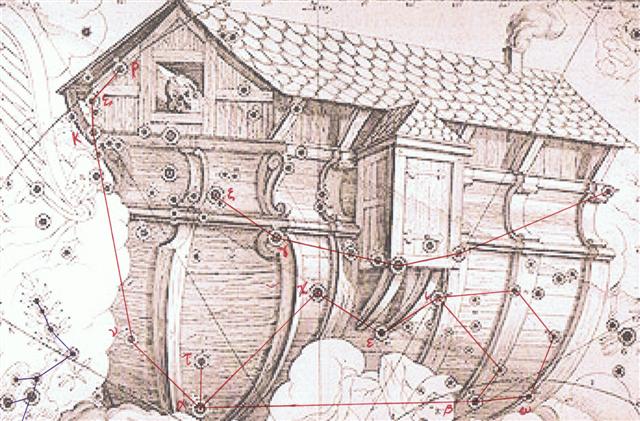 |
|
July 15 (196
= 181 + 15) |
16 |
17 (*118 =
*381 - *183) |
|
Egyptian
bread, (-t, female determinant) |
 |
Phoenician qoph |
 |
Greek
phi |
Φ(φ) |
|
... is the 21st letter of
the Greek alphabet ... Its origin is
uncertain but it may be that phi originated
as the letter qoppa ... In traditional Greek
numerals, phi has a value of 500 or 500000
...
Isaac Taylor,
History of the Alphabet: Semitic
Alphabets, Part 1, 2003: 'The old
explanation, which has again been revived by
Halévy, is that it denotes an 'ape,' the
character Q being taken to represent
an ape with its tail hanging down. It may
also be referred to a Talmudic root which
would signify an 'aperture' of some kind, as
the 'eye of a needle,' ... Lenormant adopts
the more usual explanation that the word
means a 'knot' ...

... The king, wearing now a short, stiff
archaic mantle, walks in a grave and stately
manner to the sanctuary of the wolf-god
Upwaut, the 'Opener of the Way', where
he anoints the sacred standard and, preceded
by this, marches to the palace chapel, into
which he disappears. A period of time
elapses during which the pharaoh is no
longer manifest.
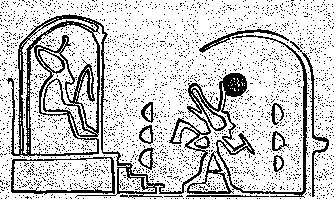
When he reappears he is clothed as in the
Narmer palette, wearing the kilt with
Hathor belt and bull's tail attatched.
In his right hand he holds the flail scepter
and in his left, instead of the usual crook
of the Good Shepherd, an object resembling a
small scroll, called the Will, the House
Document, or Secret of the Two Partners,
which he exhibits in triumph, proclaiming to
all in attendance that it was given him by
his dead father Osiris, in the
presence of the earth-god Geb. 'I
have run', he cries, 'holding the Secret of
the Two Partners, the Will that my father
has given me before Geb. I have
passed through the land and touched the four
sides of it. I traverse it as I desire.' ...
.jpg) |
After glyph Bb5-8 (→ 2 *
29) the text continues as follows - and we should keep in mind
the fact that in the day after that when the Hawaiians were
splashing water came the day when the King would make battle.
... A vestige of the practice of
putting the king to death at the end of a year's reign
appears to have survived in the festival called
Macahity, which used to be celebrated in Hawaii
during the last month of the year. About a hundred years
ago a Russian voyager described the custom as follows:
'The taboo Macahity is not unlike to our festival
of Christmas. It continues a whole month, during which
the people amuse themselves with dances, plays, and
sham-fights of every kind. The king must open this
festival wherever he is. On this occasion his majesty
dresses himself in his richest cloak and helmet, and is
paddled in a canoe along the shore, followed sometimes
by many of his subjects. He embarks early, and must
finish his excursion at sunrise. The strongest and most
expert of the warriors is chosen to receive him on his
landing. The warrior watches the canoe along the beach;
and as soon as the king lands, and has thrown off his
cloak, he darts his spear at him, from a distance of
about thirty paces, and the king must either catch the
spear in his hand, or suffer from it: there is no
jesting in the business. Having caught it, he carries it
under his arm, with the sharp end downwards, into the
temple or heavoo.
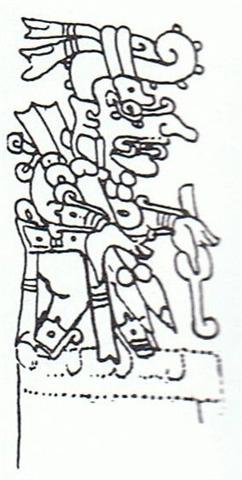
On his entrance, the assembled
multitude begin their sham-fights, and immediately the
air is obscured by clouds of spears, made for the
occasion with blunted ends. Hamamea (the king)
has been frequently advised to abolish this ridiculous
ceremony, in which he risks his life every year; but to
no effect. His answer always is, that he is as able to
catch a spear as any one on the island is to throw it at
him ...
|
Jan 17 (355 +
27 = 382) |
18 |
19 (384) |
 |
 |
 |
|
Bb5-9 (172) |
Bb5-10 |
Bb5-11 (595) |
|
mai tae
tuki to haga
- mai tae oho te rima |
mai tae te vere
ki te henua
- ko te rima e oho ki to kava |
eko te tagata kua
hakahonui |
|
Rima.
1. Hand, also, but improperly,
fingers, forearm; te ko mu'a o te rima,
palm of the hand; te ko tu'a o te rima,
back of the hand; rima hakaturu,
generous, liberal, munificent; tagata rima
pu'a, helper; rima hakakau, generous
hands, open-handed person; rima matu'a
neanea, thumb. 2. Fifth; e-rima, ka-rima,
five. Vanaga. 1. Five. P Mgv., Ta.: rima,
id. Mq.: ima, id. 2. Arm, hand; rima
atakai, obliging, kind, generous, a gift,
rima tuku, elbow, rima omo,
infidelity, faithless, unfaithful, rima o te
kahu, sleeve, kakari rima, wrist. P
Pau.: rima, hand, arm. Mgv.: rima,
hand, arm, paw, finger. Mq.: ima, hand,
arm. Ta.: rima, arm, hand, finger.
Rimahakaviriviri, fist, to clench the fist,
a blow of the fist. Rimahati, one-armed.
Rima ko manaroa, little finger T.
Rimamatua neanea, thumb. Rimaroaroa
tahaga, middle finger T. Rimatitiri,
to walk with the hands behind the back.
Rimaruru, to clasp hands. Rimatuhi henna
(?) index finger T. Rimatuhi a hana,
finger ring T (? ring finger). 3. To lead into
error; rimaetua, supernatural, Mq.:
imaima, that which returns after a man's
death, Ta.: rimaatua, plague, dissension,
mortal illness. Churchill.
Honui. 1. Person worthy of respect, person
of authority. 2. Livelihood, heirloom,
capital; ka moe koe ki toou hônui, you
must marry to ensure your livelihood (said to a
little girl); he hônui mo taaku poki,
this is the heirloom for my son. Vanaga. Great (hoonui);
honui, chief T.; tagata hoonui,
personage; hakahonui, to praise, to
commend. Churchill. |
|
RIGHT
ASCENSION DAYS AT THE FULL MOON: |
|
DRUS (Hard)
= χ Carinae
(119.9) |
ω Cancri (120.2) |
8h (121.7)
χ
Gemini (121.0),
NAOS (Ship) =
ζ
Puppis
(121.3) |
 |
|
July 18 (172 + 27) |
19 (200) |
20 |
The King had to catch the Spear, i.e. to close his fist around
his shadow tanist:
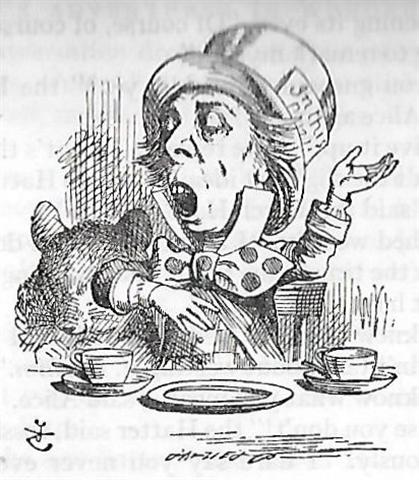
... Hercules first appears in legend
as a pastoral sacred king and, perhaps because shepherds
welcome the birth of twin lambs, is a twin himself. His
characteristics and history can be deduced from a mass
of legends, folk-customs and megalithic monuments. He is
the rain-maker of his tribe and a sort of human
thunder-storm. Legends connect him with Libya and the
Atlas Mountains; he may well have originated thereabouts
in Palaeolithic times. The priests of Egyptian Thebes,
who called him Shu, dated his origin as 17,000
years before the reign of King Amasis. He carries an
oak-club, because the oak provides his beasts and his
people with mast and because it attracts lightning more
than any other tree. His symbols are the acorn; the
rock-dove, which nests in oaks as well as in clefts of
rocks; the mistletoe, or Loranthus; and the
serpent. All these are sexual emblems. The dove was
sacred to the Love-goddess of Greece and Syria; the
serpent was the most ancient of phallic totem-beasts;
the cupped acorn stood for the glans penis in
both Greek and Latin; the mistletoe was an all-heal and
its names viscus (Latin) and ixias (Greek)
are connected with vis and ischus
(strength) - probably because of the spermal viscosity
of its berries, sperm being the vehicle of life. This
Hercules is male leader of all orgiastic rites and has
twelve archer companions, including his spear-armed
twin, who is his tanist or deputy ...
A clenched fist - rimahakaviriviri - could have
motivated the words when the Explorers reached the 3
islets outside the southwestern corner of Easter Island;
haka-viriviri →
kai-viri-kai-viri.
Outside the main land nothing could as yet have been counted
down.
Remarkably, the hands depicted in the rongorongo idiom
normally have only 3 + 1 = 4 fingers. Presumably this was because
there were only 4 quarters in the year. But we should recall the
hands of the buried Lébé:
... Ogotemmêli had his own ideas
about calculation. The Dogon in fact did use the decimal
system, because from the beginning they had counted on
their fingers, but the basis of their reckoning had been
the number eight and this number recurred in what they
called in French la centaine, which for them
meant eighty. Eighty was the limit of reckoning, after
which a new series began. Nowadays there could be ten
such series, so that the European 1,000 corresponded to
the Dogon 800. But Ogotemmêli believed that in the
beginning men counted by eights - the number of cowries
on each hand, that they had used their ten fingers to
arrive at eighty, but that the number eight appeared
again in order to produce 640 (8 x 10 x 8). 'Six hundred
and forty', he said, 'is the end of the reckoning.'
According to him, 640 covenant-stones had been thrown up
by the seventh Nummo to make the outline in the
grave of Lébé
...
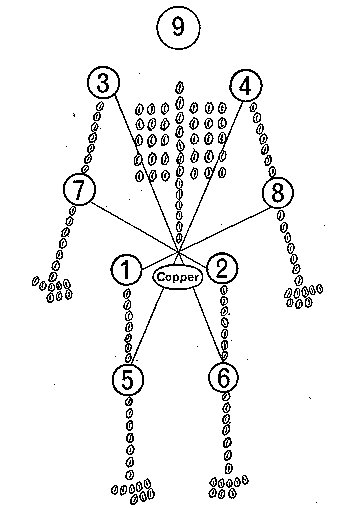
|











.jpg)






